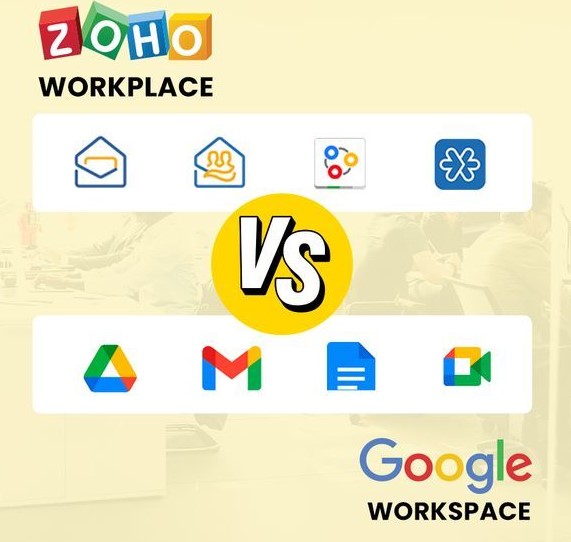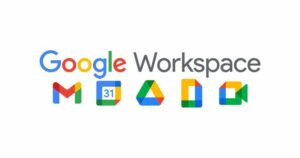Introduction: Why Data Privacy Isn’t Optional Anymore
In today’s hyper-connected world, data is more than just information—it’s your business’s reputation, credibility, and currency. Mishandling sensitive data can lead to compliance violations, loss of trust, and severe financial penalties.
Whether you’re a startup, nonprofit, freelancer, or global enterprise, the platforms you choose for communication, collaboration, and data storage must respect your privacy. In this article, we’ll explore two leading players in the space—Zoho and Google Workspace—and help you decide which one aligns better with your business values and privacy expectations.

Let’s dissect this from every angle.
1. Data Ownership: Who Owns Your Business Data?
🟢 Zoho: You Own It. Period.
Their approach to data ownership is refreshingly clear. Your business data belongs solely to you. There’s no third-party monetization, no hidden terms, and no advertising-based models influencing the platform’s operations. You have full authority to export, manage, and delete your data at any time.

🔴Google Workspace: Ownership with Caveats
Google also states that users own their data. However, it reserves the right to use certain metadata and activity logs for service improvement. While data export tools like Google Takeout exist, instant deletion isn’t always guaranteed or straightforward.
2. Data Storage & Server Locations
🟢 Zoho: Transparent & Customizable
It operates multiple data centers across the US, Europe, India, and Australia. It allows users to choose their preferred server region and offers data localization—something especially important for businesses with regional privacy laws. Support for South Asia, including Nepal, is on their roadmap.
🔴 Google Workspace: Global Scale, Limited Granularity
The cloud infrastructure spans the globe, offering reliability and performance. While Workspace admins can apply data region policies, the system lacks the same level of transparency and customization that Zoho provides.
3. Encryption: Who Secures It Better?
🟢 Zoho: Simplified and Strong by Default
It uses AES-256 encryption for data at rest and TLS 1.2+ for data in transit. End-to-end encryption is available in core apps like Zoho Mail. The platform also supports email authentication standards like SPF, DKIM, and optional S/MIME.
🔴 Google Workspace: Advanced Options for Enterprises
It also uses AES-256 and TLS for standard encryption. At the enterprise level, Google offers advanced key management features, including Client-Side Encryption (CSE) and Customer-Managed Encryption Keys (CMEK), but these features may be overkill for smaller organizations.
4. Compliance & Certifications
| Standard | Zoho | |
| GDPR | ✅ | ✅ |
| HIPAA | ✅ (on request) | ✅ |
| ISO/IEC 27001 | ✅ | ✅ |
| SOC 2 | ✅ | ✅ |
| CCPA | ✅ | ✅ |
📌Note:
Zoho’s Edge: Complies with these standards without leveraging user data for advertising or behavioral profiling.
Google Workspace: Meets the same standards but has faced past controversies over how user data has been handled or monetized.
5. Advertising & Data Monetization
🟢 Zoho: Subscription-Powered, Not Ad-Driven
It is proudly bootstrapped and runs on a pure subscription model. There’s no advertising—ever. Your usage data isn’t harvested for ad targeting or sold to third parties. This makes Zoho a strong choice for organizations where ethics and transparency matter.
🔴Google Workspace: Ad Roots Still Linger
Even in its paid Workspace offerings, Google collects anonymized data to improve machine learning models. While ads aren’t served in paid tiers, the underlying ad-supported legacy of the Google ecosystem can cause discomfort for privacy-conscious businesses.
6. Admin Controls & Privacy Settings
🟢 Zoho: Simplicity with Security
It provides detailed admin controls, intuitive dashboards, and privacy-friendly defaults. Admins can easily manage permissions, set access policies, and configure account security—all without digging through dozens of menus.
🔴Google Workspace: Enterprise-Grade Power, Less Intuitive
The Admin Console is robust and highly customizable, but it often requires technical knowledge to fully utilize. Privacy settings, including ad personalization, history tracking, and activity logs, must be manually configured by users or admins.
7. Bonus: The “Trust Factor”
Zoho: Ethics by Design
It is 100% privately owned, with no investor pressure. Its CEO has been vocal against surveillance capitalism and advocates for digital sovereignty. The company’s global operations are guided by a strong stance on ethics, privacy, and user control.
Google Workspace: Power with Complexity
Google’s tools are powerful and widely adopted, but the company has faced numerous legal challenges over its data practices. Despite efforts to be transparent, the business model’s reliance on data-driven products creates lingering trust issues.
Final Verdict: Zoho or Google Workspace?
| Category | Winner |
| Data Ownership | Zoho |
| Monetization | Zoho |
| Encryption | Tie |
| Compliance | Tie |
| Admin Simplicity | Zoho |
| Advanced Controls | |
| Advertising-Free | Zoho |
🧨 If your business values ethics, simplicity, and no hidden data usage, Zoho wins.
🔐 If you need heavy enterprise infrastructure with complex key management, Google shines.
Summary: Choosing the Right Platform for Your Business
Choose Zoho if you value ethical software, clean data policies, and user-friendly privacy features. It’s perfect for agencies, nonprofits, privacy-first startups, and SMEs.
Choose Google Workspace if you’re a large enterprise that requires complex workflows, granular admin controls, or advanced encryption tools.
In 2025, making the right decision about your communication and collaboration tools is about more than features. It’s about trust, transparency, and long-term alignment with your values.
